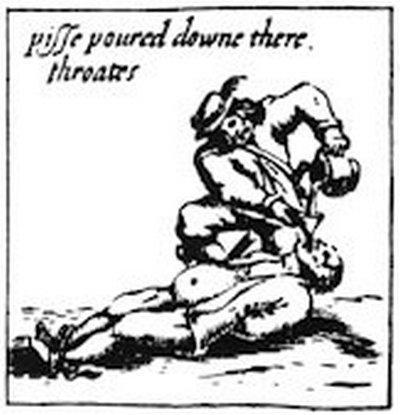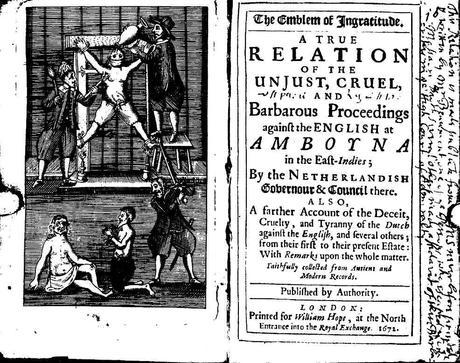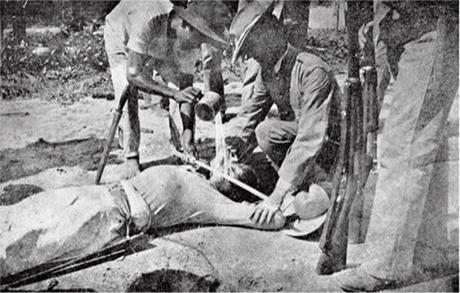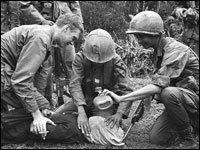 It's a tie, with plenty of dirty old bad pennies to spread around!
It's a tie, with plenty of dirty old bad pennies to spread around!Politifact gives their award for lie of the year to lies, plural, about the Ebola virus, spread by conservatives, especially anti-Obama conspiracy theory peddlers. (Once again, proving conservatives are fact-averse and believe things which are false, which they could EASILY verify -- if they WANTED to know the truth. They don't.)
You can read the Ebola lies enumerated here.
We join politifact, in giving the lie of the year award to both the Ebola lies, but also to Dick Cheney, for his lies about torture and valuable intelligence, and his criticism of the Senate investigation, which found substantive challenges to the Bush administration revisionist version of history - in other words, LIES.)
Factcheck.org, in their piece Cheney's Tortured Facts, itemize many, if not all, of the lies from I'm-a-Dick Cheney.
First, let's be clear. Torture does not result in truth. Torture results in whatever 'information' the torturers want to hear. Torture results in the waste of intelligence resources, chasing false results from torture. What DOES work is non-violent, non-humiliating interrogation.
Waterboarding and other techniques authorized by Bush and Cheney were torture, whatever euphemism they tried to stick on it or whitewash it.
Waterboarding was torture back in the dark ages.

Commons Getty Collection - waterboarding, lower right corner
Waterboarding was torture in 17th and 18th century (with the occasional variation of replacing water with urine):



And it was recognized as torture in the late 19th and early 2oth century, including being condemned by famous figures in our history, like Mark Twain, when we did it in the Philippines during our 'liberation', 1899 -1902. A member of our armed forces was prosecuted in 1901 for waterboarding a Philippino.
Twain's words, back in the day, addresses the failure of waterboarding or other torture to produce results:
"To make them confess -- what? Truth? Or lies? How can one know which it is they are telling? For under unendurable pain a man confesses anything that is required of him, true or false, and his evidence is worthless."
In 1901 Maj. Ed Glenn was suspended and fined for torture in the Philippines. From an NPR report:
In his review, the Army judge advocate said the charges constituted "resort to torture with a view to extort a confession." He recommended disapproval because "the United States cannot afford to sanction the addition of torture."
and another Republican president tried to excuse torture (from the same report):
Yet President Theodore Roosevelt defended the practice. "The enlisted men began to use the old Filipino method: the water cure," he wrote in a 1902 letter. "Nobody was seriously damaged."

Vietnam era waterboarding
circa 1968
So, we know waterboarding is torture, we know waterboarding is wrong, and we know waterboarding doesn't work to produce reliable intelligence information.
Let's then turn to the excuses, the pretexts, for it, again citing from the NPR article quoted above:
Stephen Rickard, Washington director of the Open Society Institute, says that throughout the centuries, the justifications for using waterboarding have been remarkably consistent.
"Almost every time this comes along, people say, 'This is a new enemy, a new kind of war, and it requires new techniques,'" he says. "And there are always assurances that it is carefully regulated."
I would go a step further. When Bush and Cheney insist they only used torture to protect us from terrorists, they were attempting to make us complicit in their crimes. It is a thinly veiled excuse of "we did it for you", or "you made us do it to protect you". It is nothing more or less than an attempt to shift the blame for their bad decisions to us, their CRIMINAL decisions to us, without our having knowledge or approval of those decisions.
Further, they LIED to the people of this nation about their actions.
Bush and Cheney and those in the administration who contrived to give them false cover are the ones who should be held accountable as war criminals for their clear and obvious war crimes, like those before them.
It is worth noting that some of the worst and most brutal regimes have NOT used waterboarding - notably the Soviet Union under their 20th century dictators, and not the Nazis (although their allies, the Japanese DID).
Torture is wrong, torture is useless, and the use of torture makes us LESS safe, not more safe. That claim by Cheney about attacks on the U.S.? Wrong.
From the Guardian:
The Global Terrorism Database has recorded terror attacks across the world - with data from 1970 covering up to the end of 2011. It's a huge dataset: over 104,000 attacks, including around 2,600 in the US - and its collection is funded by an agency of the US government: the Science and Technology Directorate of the US Department of Homeland Security through a Center of Excellence program based at the University of Maryland.
Under Bush/Cheney there were `12 attacks on diplomatic missions, technically U.S. territory. Under Bush/Cheney, there were also attacks in the U.S. (although not all were successful, or resulted in injury or death.) From our own national statistics, attacks DECLINED, including when President Bush, and then subsequently President Obama terminated the torture practices and other humiliating and harsh interrogation.
From the "Integrated United States Security Database: Data on Terrorist Attacks on the United States Homeland 1970-2011", completed in 2012:
- There were a total of 207 terrorist attacks in the United States between 2001 and 2011.Total attacks declined from a high of 40 in 2001 to nine in 2011.
- Between 2001 and 2011, we recorded a total of 21 fatal terrorist attacks in the United States.
- The highest proportion of unsuccessful attacks since 1970 occurred in 2011, when four out of nine recorded attacks were unsuccessful.
- From 2001 to 2011 California (40) and New York (19) experienced the most total terrorist attacks against the U.S. homeland.
- The three cities in the United States that experienced the most attacks from 2001 to 2011 were New York City (12), Washington, DC (9) and Los Angeles (8).
- The most common weapons used in terrorist attacks in the United States from 2001 to 2011 were incendiary devices (53% of all weapons used) and explosives (20% of all weapons used).
- For the period from 2001 to 2011, biological weapons were tied with firearms as the third most common weapon used in terrorist attacks (both represented 8% of all weapons used). This unusual result is due to the anthrax attacks in October 2001.
- From 2001 to 2011, non-explosive attacks aimed at damaging property or reducing the functionality of a system but not causing direct human injury accounted for more than half (54%) of all tactics used. Many of these cases were due to an increased reliance on arson, much of it associated with environmental and animal rights violent extremist groups.
- From 2001 to 2011, the most common targets of terrorists in the United States were businesses (62 attacks), private citizens and property (59 attacks), and government (43 attacks).
- The three terrorist organizations with the largest number of attacks on the U.S. homeland from 2001 to 2011 were the Earth Liberation Front (50), the Animal Liberation Front (34) and al -Qa’ida (4)
